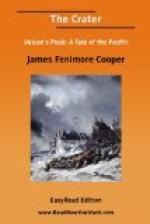But the principal cargo of the dingui was not the dozen fish mentioned. Bob had nearly filled the boat with a sort of vegetable loam, that he had found lodged in the cavity of one of the largest rocks, and which, from the signs around the place, he supposed to have been formed by deposits of sea-weed. By an accident of nature, this cavity in the rock received a current, which carried large quantities of floating weed into it, while every storm probably had added to its stores since the mass had risen above the common level of the sea, by throwing fresh materials on to the pile, by means of the waves, nothing quitting it. Bob reported that there were no signs of vegetation around the rock, which circumstance, however, was easily enough accounted for by the salt water that was incessantly moistening the surface, and which, while it took with it the principle of future, was certain to destroy all present, vegetable life; or, all but that which belongs exclusively to aquatic plants.
“How much of this muck do you suppose is to be found on your rock, Bob?” asked Mark, after he had examined the dingui’s cargo, by sight, taste, and smell. “If is surprisingly like a rich earth, if it be not actually so.”
“Lord bless you, Mr. Mark, there is enough on’t to fill the old ’Cocus, ag’in and ag’in. How deep it is, I don’t pretend to know; but it’s a good hundred paces across it, and the spot is as round as that there chimbly, that you call a cr’ature.”
“If that be the case, we will try our hands at it next week, and see what can be done with an importation. I do not give up the blessed hope of the boat, Bob—that you will always bear in mind—but it is best to keep an eye on the means of living, should it please God to prevent our getting to sea again.”
“To sea, Mr. Mark, neither you nor I, nor any mortal man will ever get, in the old ’Cocus ag’in, as I know by the looks of things outside of us. ’Twill never do to plant in my patch, however, for the salt water must wash it whenever it blows; though a very little work, too, might keep it out, when I come to think on it. Sparrow-grass would grow there, as it is, desperately well; and Friend Abraham White had both seeds and roots put up for the use of the savages, if a body only know’d whereabouts to look for them, among the lot of rubbish of that sort, that he sent aboard.”
“All the seeds and roots are in two or three boxes, in the steerage,” answered Mark. “I’ll just step up to the crater and bring a shovel, to throw this loam out of the boat with, while you can clean the fish and cook the supper. A little fresh food, after so much salt, will be both pleasant and good for us.”
Bob assented, and each went his way. Mark threw the loam into a wheelbarrow, of which Friend Abraham had put no less than three in the ship, as presents to the savages, and he wheeled it, at two or three loads, into the crater, where he threw it down in a pile, intending to make a compost heap of all the materials of the sort he could lay his hands on.




